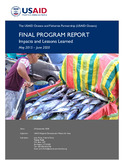| dc.description | The USAID Oceans and Fisheries Partnership (USAID Oceans) was a 5-year project initiated in May 2015 as a partnership between the U.S. Agency for International Development (USAID), the Southeast Asian Fisheries Development Center (SEAFDEC), and the Coral Triangle Initiative for Coral Reefs, Fisheries, and Food Security (CTI-CFF). It was developed to respond to the devastating environmental, economic, and human impacts of illegal, unreported, and unregulated (IUU) fishing across Southeast Asia.
Catch documentation and traceability (CDT) efforts in Southeast Asia’s fisheries have historically been paper-based and limited to large, commercial companies, presenting challenges in compiling, analyzing, and using data to document and trace fish catch and inform fisheries management practices. Electronic catch documentation and traceability (eCDT) systems alleviate these challenges, particularly when they include small-scale fishers, whose numbers greatly exceed large-scale fishing vessels. Supporting the development, testing, and scaling of eCDT systems was a key component of USAID Oceans’ work. eCDT systems document key information about seafood products and allow them to be traced throughout the supply chain. eCDT systems provide a way to ensure seafood is legally caught and properly labeled, support national fisheries management, and allow countries to comply with national, regional, and international seafood regulations and import requirements.
USAID Oceans focused on four technical areas—strengthening eCDT systems; using eCDT to better regulate fishing and curb IUU practices; developing strategic public-private partnerships that capitalize on innovative technological expertise; and integrating human welfare and gender considerations throughout all activities for more equitable supply chains. By focusing on these areas, the project sought to develop and expand financially sustainable eCDT systems to priority biodiversity areas in the Asia-Pacific region; strengthen human and institutional capacity to conserve marine biodiversity; and enhance partnerships for sustainable fisheries management.
Over five years, USAID Oceans piloted seven eCDT tools that tracked nearly 2,000 metric tons of seafood within the supply chain in Southeast Asia. The project supported the development of legal instruments and capacity building to improve management of over 100 million hectares of biologically significant areas and promote gender equity in fisheries.
Throughout the implementation period, USAID Oceans learned numerous lessons about challenges, best practices, essential stakeholders, and key issues in Southeast Asia’s seafood industry. This report shares these lessons and provides recommendations for regional, government, and NGOs to continue working towards regional and global objectives to ensure a legal, fair, and sustainable seafood industry.
More work is needed to continue refining these systems. As these systems are scaled, they must also be tailored to contextual needs of various countries and stakeholders. Ultimately, national eCDT systems must provide integrated solutions and fisheries managers must have the capacity to compile and analyze eCDT data and apply these data to improve fisheries management, conserve biodiversity, protect human rights, and ensure sustainable fishing practices.
While USAID Oceans has made progress in each of these areas, there is still more to be done. The project looks to partners to carry forward this essential work. USAID Oceans hopes this report will serve as a guide for ongoing efforts to strengthen regional cooperation to combat IUU fishing, promote sustainable fisheries, and conserve marine biodiversity in the Asia-Pacific region. | en |

